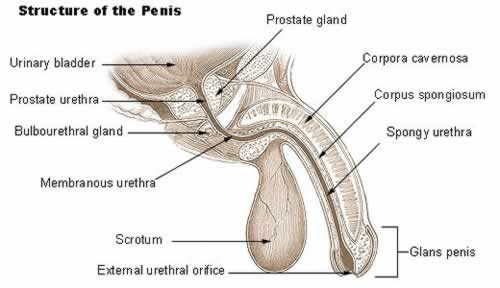Hey there Guys,
Today I thought I would tackle the topic of erectile dysfunction.
Erectile dysfunction is a fairly common problem in general practice but it is often a difficult one to discuss, as both the patient and doctor may find this an embarrassing subject.
I hope that today’s article might help blokes feel more comfortable talking about the subject, allowing you to receive better treatment and satisfaction in the sex arena.
Before I dive into erection problems though, let’s talk about how erections work. This will make understanding the problems much easier.
So how do erections work?

For those who are mechanically minded you are going to love this. You see the penis runs on a hydraulic system. On the top of the penis are two large spongy chambers called the corpora cavernosa, and along the base is a third chamber that surrounds the urethra called the corpus spongiosum. These chambers have a rich blood supply which enable them to fill with blood when required.
There are two main pathways to getting an erection.
The first pathway is at the level of the brain. When thinking about sex, or the possibility of sex, the brain sends a signal down the spine to a special area in the middle of the back called the “thoracolumbar erection centre”. This in turn signals for blood to be redirected away from the pelvis into the penis.
The second pathway is via a spinal reflex from stimulation of the skin on and around the penis. This is the same reflex that leads to erections when receiving a massage. This reflex directs more blood towards the penis to help fill the chambers mentioned above.
In both of these cases the parasympathetic nervous system, the nervous system associated with feeling relaxed, runs the show. If someone is stressed or fearful it makes getting an erection very difficult.
No matter what path starts an erection once the blood is flowing the chambers of the penis start to fill stretching the penis and making it firm.
A special neurotransmitter, nitric oxide, helps maintain the erection. After ejaculation the parasympathetic system turns off and the blood flows out of the penis again, shrinking back to regular size.
I understand that this may sound a little complex but I wanted to highlight some of the important parts of the process as it helps explain how problems with getting erections can start.
To put it in a nut shell there are three main areas where erection problems can start:
- Problems with the hydraulic systems
- Problems with the signalling supply
- Problems with the control system
Hydraulic problems
Hydraulic problems can be separated down into two main areas, problems with the hydraulic chambers and problems of delivery of blood to fill the chambers.
Damage to the hydraulic chambers is not very common; the main causes being direct trauma to the penis causing scar tissue to form, or a Peyronies disease. Peyronies disease is a thickening of the outer layer of the penile chambers. This can lead to unusual bending of the penis that can limit the flow of blood and also makes penetration very difficult. Good news is that there are treatments available that can help reduce the scar tissue and help improve erections.
The most common causes of decreased blood flow to the penis are diabetes and heart disease. Both these conditions can lead to plaques forming in the arteries that supply the penis. As these plaques can decrease the flow of blood this can result in a drop in pressure making it harder for the penile chambers to fill and reach full engorgement.
It’s important to note that the arteries that supply the penis are almost the same size as the arteries that supply the heart. Having difficulties gaining erections can be an early indicator of heart disease, another good reason to be open and frank with your doctor. Treatment may not just improve your sex life, it might save your life!
Smokers or people with diabetes or heart disease also have lower levels of the neurotransmitter nitric oxide, which is needed to maintain full erections.If nitric oxide is low, guys may be able to gain a full erection but it does not last.
Signalling problems
When it comes to the signalling causes of erection difficulties, there are two main causes. Either the electrical system via the nerves is not working, or the hormonal system via the blood supply is not working.
Damage to the spinal chord does not necessarily block the ability to gain erections. While erections that start at the level of the brain may be blocked, men who have spinal injuries are often able to gain erections via the reflex pathway as it does not require a direct connection to the brain.
Unfortunately some operations can cause particular damage to the nerves that supply the penis which can result in total inability to gain erections. The worse offender is some surgical treatments for prostate cancer. Sometimes the nerves can also be damaged if there are other operations within the pelvis.
Diabetes can lead to damage of the nerves of the penis. This can make getting erections difficult or even complete impotence in guys with poor control of their blood sugar. If you have diabetes it’s important to be open and frank with your doctor if you have erection difficulties, as these issues can be avoided.
By far the most common hormonal cause of erection difficulty is either low testosterone or thyroid disfunction. Testosterone is important at the level of the brain for increasing desire for sex, but also plays a role in keeping levels of nitric oxide up which is essential for a strong, lasting erection.
Thyroid dysfunction can cause reduction in sex drive, difficulty getting erections and altered ejaculation. The good news is that both of these hormones are easily tested and if there are alterations in their levels, this can be addressed.
Control system problems
By far the biggest cause of erection problems is stress, anxiety and depression.
As mentioned above, for an erection to occur, the body needs to be relaxed, which allows the parasympathetic nervous system to initiate the development of an erection. If you are stressed or nervous, getting an erection is much more difficult.
Depression is known to reduce libido however some of the medications used to treat depression can also effect abilities to get erections. This is particularly prominent in the SSRI, or seratonin reuptake inhibitor family of drugs.
Other medications known to effect erections and libido include medicines that treat blood pressure, cholesterol, some severe psychiatric disorders and prostate cancer. This is usually due to their impact on the hormone modulators required for healthy erections.
A number of illicit drugs also reduce the ability to gain erections including speed, cocaine, ecstasy and pot. Don’t forget the legal drugs as well such as nasal decongestants, and perhaps the most common of all…alcohol and cigarettes.
What to do if you are concerned
If you have worries or concerns your family doctor is a great person to talk with. As part of evaluating the issue your doctor will want to have a quite frank conversation about your sexual history and erections. If you are not comfortable talking about this with your regular doctor it can be sometimes be worth seeing a men’s health doctor. We have pretty much heard most of the stories and you can feel reassured that there would be no judgement of sexuality or practices.
As part of the evaluation it is normal to take a detailed history and to check for signs of other causes. This includes an examination of your heart, blood pressure and pulses for signs of heart disease, an examination of the testicles and penis for any signs of reduced testosterone or Peyronie’s disease, and your waist measurement and weight for indicators of heart disease.
Your doctor may also wish to organise blood tests to check for diabetes, low testosterone, thyroid dysfunction and heart disease.
Good news is that for many people with erection problems, there are some very effective treatments.
In my next post I will be talking about the main treatments for erectile dysfunction.
Yours in good health.
Dr George
PS, please help spread the health by hitting the like button below, you just never know who you help out! Click now and help a mate!

Leave a Reply